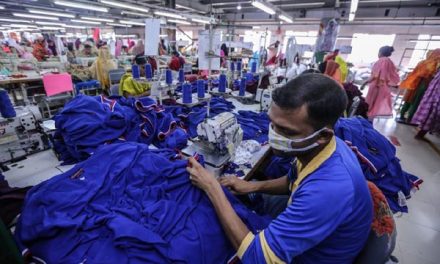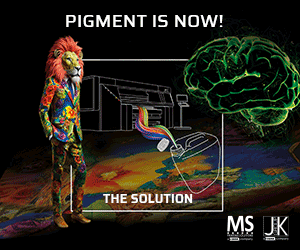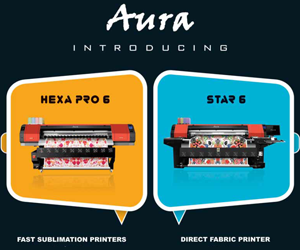 Cellulosic fiber specialist Lenzing has been recognised for its Tencel Modal with Indigo Colour technology, a dyeing process that offers a more sustainable method of producing knitted denim.
Cellulosic fiber specialist Lenzing has been recognised for its Tencel Modal with Indigo Colour technology, a dyeing process that offers a more sustainable method of producing knitted denim.
Lenzing was a recipient of ITMF’s Sustainability & Innovation Award, which seeks “to recognize sustainable and innovative achievements in the textile industry with focus on innovation, design, development, and production under the strictest standards of sustainability and respect for the environment.”
Lenzing’s spun-dyed Tencel Modal with Indigo technology fibers have been designed to change up the colouration process to make it more eco-responsible. Instead of dyeing spun yarns, this modal adds indigo pigment into the production process, creating indigo dyed fibres.
“At Lenzing, sustainability and innovation are key drivers of our business, and it is truly an honor to be recognized by industry players and the ITMF Awards,” said Florian Heubrandner, Vice President Global Textiles Business at Lenzing. “Through a blend of eco-responsible materials and pioneering technology, we created a new benchmark for the denim industry with Tencel Modal with Indigo Color technology. We will continue to innovate our fiber offerings to address the rising demand for eco-responsible alternatives. With each fiber innovation, we are one step closer to reducing environmental impact of our textile industry ecosystem.”
The fiber has been designated BioPreferred by the United States Department of Agriculture (USDA) and certified with the EU Ecolabel. Compared to water and energy intensive conventional indigo dyeing, this technology provides indigo coloration with a 99 percent water and electricity saving, 80 percent chemical saving and 100 percent heat energy reduction, along with less wastewater produced. In addition, a specially commissioned indigo pigment from dyestuff manufacturer DyStar, ensures that Tencel Modal with Indigo Color technology can be certified with Standard 100 by OEKO-TEX, guaranteeing ultra-low levels of aniline.
Outside of its sustainability appeal, the fiber’s spun-dyed properties give it improved colorfastness. This opens indigo up to new categories including knits. Because it is devoid of harsh chemicals, it is also safe for baby goods such as clothing and bedding.
After it launched in 2021, Tencel Modal with Indigo Colour technology was quickly adopted by a number of manufacturers as an alternative to traditionally indigo dyed yarns. “While we continue to explore different washes, effects and fiber blends, we are open for innovation and what can be done,” added Tricia Carey, director of global business development denim and Americas, Lenzing. “Beyond the denim market there are already commercial programs in knitwear. With so many great minds and new ideas out in the market, this is an excellent opportunity to experiment with something new and lower the environmental footprint.”
Among the early launch collaborators for Tencel Modal with Indigo Color technology was Adriano Goldschmied, founder of House of Gold, who is widely regarded as the “Godfather of Denim” for his progressive vision in denim development. “The Tencel brand is leading revolutionary change for the denim industry and it has always been one of my go-to eco-fibers for my collections,” said Goldschmied. “We are thrilled to collaborate and launch the ‘Seed of Joy’ concept capsule with woven, circular and sweater knit fabrics using Tencel Modal with Indigo Color technology, in partnership with mills such as Blue Diamond and In The Loop, as well as machinery producer Shima Seiki.”
Tencel Modal with Indigo is therefore seen as a game-changer for flat-bed knit applications. Traditionally, when trying to knit with indigo yarns, the indigo dye was a problem for knit manufacturers since the yarns stained the needles on the machines during the knitting process. The dye stain builds up over time and requires heavy cleaning after production runs to keep the machines in workable condition.
Tencel Modal with Indigo yarns ultimately resolves this issue by changing its dyeing process in collaboration with DyStar, having superior dry and wet crocking and rubbing. By using these yarns in combination with Shima Seiki’s WHOLEGARMENT 3D knitting technologies, knitters are able to drastically reduce wastage and achieve savings by producing garments in a sustainable form of knitting. WHOLEGARMENT machines knit garments all in one-piece from yarn to garment with no need for cut & sew or linking, and offers a new and truly sustainable knit offering to the fashion industry.
Although WHOLEGARMENT – 3D Knitting technology is over 25 years old, there haven’t been too many denim applications in the past because designers stayed away from Indigo yarns due to their crocking issues which most knitwear manufacturers avoided. However, the new Tencel Modal with Indigo solves the crocking issue, creating a new yarn that can be used by knitters without any issues of staining machines.













